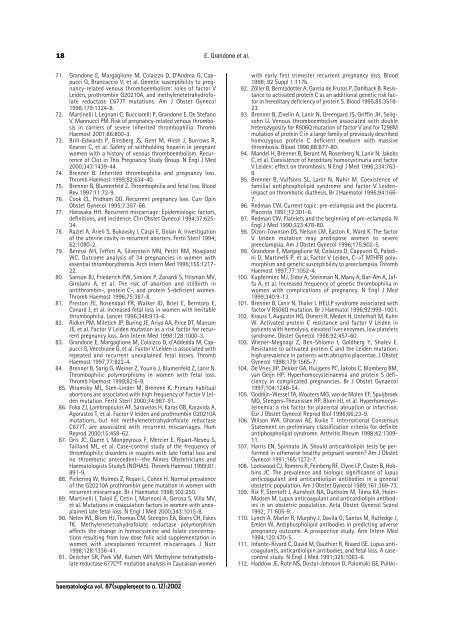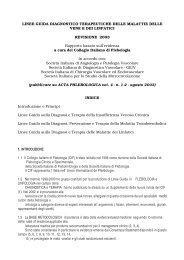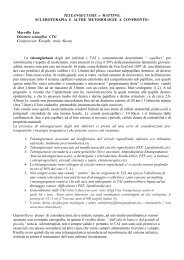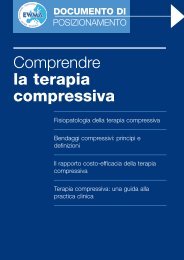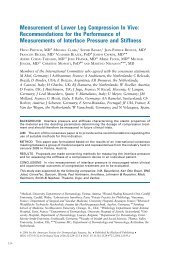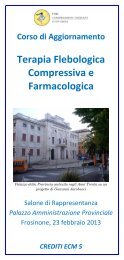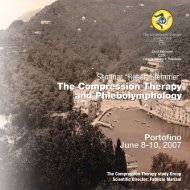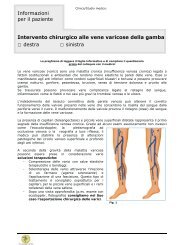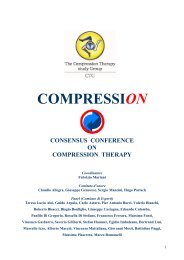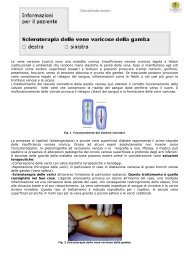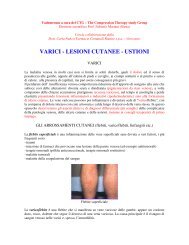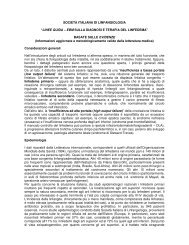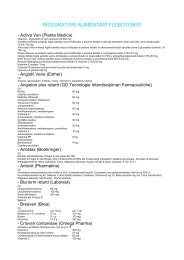Linee guida SISET in Ostetricia e Ginecologia - Terapia compressiva
Linee guida SISET in Ostetricia e Ginecologia - Terapia compressiva
Linee guida SISET in Ostetricia e Ginecologia - Terapia compressiva
Create successful ePaper yourself
Turn your PDF publications into a flip-book with our unique Google optimized e-Paper software.
18<br />
71. Grandone E, Margaglione M, Colaizzo D, D'Andrea G, Cappucci<br />
G, Brancaccio V, et al. Genetic susceptibility to pregnancy-related<br />
venous thromboembolism: roles of factor V<br />
Leiden, prothromb<strong>in</strong> G20210A, and methylenetetrahydrofolate<br />
reductase C677T mutations. Am J Obstet Gynecol<br />
1998;179:1324-8.<br />
72. Mart<strong>in</strong>elli I, Legnani C, Bucciarelli P, Grandone E, De Stefano<br />
V, Mannucci PM. Risk of pregnancy-related venous thrombosis<br />
<strong>in</strong> carriers of severe <strong>in</strong>herited thrombophilia. Thromb<br />
Haemost 2001;86:800-3.<br />
73. Brill-Edwards P, G<strong>in</strong>sberg JS, Gent M, Hirsh J, Burrows R,<br />
Kearon C, et al. Safety of withhold<strong>in</strong>g hepar<strong>in</strong> <strong>in</strong> pregnant<br />
women with a history of venous thromboembolism. Recurrence<br />
of Clot <strong>in</strong> This Pregnancy Study Group. N Engl J Med<br />
2000;343:1439-44.<br />
74. Brenner B. Inherited thrombophilia and pregnancy loss.<br />
Thromb Haemost 1999;82:634-40.<br />
75. Brenner B, Blumenfeld Z. Thrombophilia and fetal loss. Blood<br />
Rev 1997;11:72-9.<br />
76. Cook CL, Pridham DD. Recurrent pregnancy loss. Curr Op<strong>in</strong><br />
Obstet Gynecol 1995;7:357-66.<br />
77. Hatasaka HH. Recurrent miscarriage: Epidemiologic factors,<br />
def<strong>in</strong>itions, and <strong>in</strong>cidence. Cl<strong>in</strong> Obstet Gynecol 1994;37:625-<br />
34.<br />
78. Raziel A, Arieli S, Bukovsky I, Caspi E, Golan A. Investigation<br />
of the uter<strong>in</strong>e cavity <strong>in</strong> recurrent aborters. Fertil Steril 1994;<br />
62:1080-2.<br />
79. Beressi AH, Tefferi A, Silverste<strong>in</strong> MN, Petitt RM, Hoagland<br />
WC. Outcome analysis of 34 pregnancies <strong>in</strong> women with<br />
essential thrombocythemia. Arch Intern Med 1995;155:1217-<br />
22.<br />
80. Sanson BJ, Friederich PW, Simioni P, Zanardi S, Hilsman MV,<br />
Girolami A, et al. The risk of abortion and stillbirth <strong>in</strong><br />
antithromb<strong>in</strong>-, prote<strong>in</strong> C-, and prote<strong>in</strong> S-deficient women.<br />
Thromb Haemost 1996;75:387-8.<br />
81. Preston FE, Rosendaal FR, Walker ID, Briet E, Berntorp E,<br />
Conard J, et al. Increased fetal loss <strong>in</strong> women with heritable<br />
thrombophilia. Lancet 1996;348:913-6.<br />
82. Ridker PM, Miletich JP, Bur<strong>in</strong>g JE, Ariyo AA, Price DT, Manson<br />
JE, et al. Factor V Leiden mutation as a risk factor for recurrent<br />
pregnancy loss. Ann Intern Med 1998;128:1000-3.<br />
83. Grandone E, Margaglione M, Colaizzo D, d'Addedda M, Cappucci<br />
G, Vecchione G, et al. Factor V Leiden is associated with<br />
repeated and recurrent unexpla<strong>in</strong>ed fetal losses. Thromb<br />
Haemost 1997;77:822-4.<br />
84. Brenner B, Sarig G, We<strong>in</strong>er Z, Younis J, Blumenfeld Z, Lanir N.<br />
Thrombophilic polymorphisms <strong>in</strong> women with fetal loss.<br />
Thromb Haemost 1999;82:6-9.<br />
85. Wramsby ML, Sten-L<strong>in</strong>der M, Bremme K. Primary habitual<br />
abortions are associated with high frequency of Factor V Leiden<br />
mutation. Fertil Steril 2000;74:987-91.<br />
86. Foka ZJ, Lambropoulos AF, Saravelos H, Karas GB, Karavida A,<br />
Agorastos T, et al. Factor V leiden and prothromb<strong>in</strong> G20210A<br />
mutations, but not methylenetetrahydrofolate reductase<br />
C677T, are associated with recurrent miscarriages. Hum<br />
Reprod 2000;15:458-62.<br />
87. Gris JC, Quere I, Monpeyroux F, Mercier E, Ripart-Neveu S,<br />
Tailland ML, et al. Case-control study of the frequency of<br />
thrombophilic disorders <strong>in</strong> couples with late foetal loss and<br />
no thrombotic antecedent--the Nimes Obstetricians and<br />
Haematologists Study5 (NOHA5). Thromb Haemost 1999;81:<br />
891-9.<br />
88. Picker<strong>in</strong>g W, Holmes Z, Regan L, Cohen H. Normal prevalence<br />
of the G20210A prothromb<strong>in</strong> gene mutation <strong>in</strong> women with<br />
recurrent miscarriage. Br J Haematol 1998;102:250.<br />
89. Mart<strong>in</strong>elli I, Taioli E, Cet<strong>in</strong> I, Mar<strong>in</strong>oni A, Gerosa S, Villa MV,<br />
et al. Mutations <strong>in</strong> coagulation factors <strong>in</strong> women with unexpla<strong>in</strong>ed<br />
late fetal loss. N Engl J Med 2000;343:1015-8.<br />
90. Nelen WL, Blom HJ, Thomas CM, Steegers EA, Boers CH, Eskes<br />
TK. Methylenetetrahydrofolate reductase polymorphism<br />
affects the change <strong>in</strong> homocyste<strong>in</strong>e and folate concentrations<br />
result<strong>in</strong>g from low dose folic acid supplementation <strong>in</strong><br />
women with unexpla<strong>in</strong>ed recurrent miscarriages. J Nutr<br />
1998;128:1336-41.<br />
91. Deitcher SR, Park VM, Kutteh WH. Methylene tetrahydrofolate<br />
reductase 677C®T mutation analysis <strong>in</strong> Caucasian women<br />
haematologica vol. 87(supplement to n. 12):2002<br />
E. Grandone et al.<br />
with early first trimester recurrent pregnancy loss. Blood<br />
1998; 92 Suppl 1:117b.<br />
92. Zöller B, Berntsdotter A, Garcia de Frutos P, Dahlback B. Resistance<br />
to activated prote<strong>in</strong> C as an additional genetic risk factor<br />
<strong>in</strong> hereditary deficiency of prote<strong>in</strong> S. Blood 1995;85:3518-<br />
23.<br />
93. Brenner B, Zivel<strong>in</strong> A, Lanir N, Greengard JS, Griff<strong>in</strong> JH, Seligsohn<br />
U. Venous thromboembolism associated with double<br />
heterozygosity for R506Q mutation of factor V and for T298M<br />
mutation of prote<strong>in</strong> C <strong>in</strong> a large family of previously described<br />
homozygous prote<strong>in</strong> C deficient newborn with massive<br />
thrombosis. Blood 1996;88:877-80.<br />
94. Mandel H, Brenner B, Berant M, Rosenberg N, Lanir N, Jakobs<br />
C, et al. Coexistence of hereditary homocyst<strong>in</strong>uria and factor<br />
V Leiden: effect on thrombosis. N Engl J Med 1996;334:763-<br />
8.<br />
95. Brenner B, Vulfsons SL, Lanir N, Nahir M. Coexistence of<br />
familial antiphospholipid syndrome and factor V Leidenimpact<br />
on thrombotic diathesis. Br J Haematol 1996;94:166-<br />
7.<br />
96. Redman CW. Current topic: pre-eclampsia and the placenta.<br />
Placenta 1991;12:301-8.<br />
97. Redman CW. Platelets and the beg<strong>in</strong>n<strong>in</strong>g of pre-eclampsia. N<br />
Engl J Med 1990;323:478-80.<br />
98. Dizon-Townson DS, Nelson LM, Easton K, Ward K. The factor<br />
V Leiden mutation may predispose women to severe<br />
preeclampsia. Am J Obstet Gynecol 1996;175:902-5.<br />
99. Grandone E, Margaglione M, Colaizzo D, Cappucci G, Palad<strong>in</strong>i<br />
D, Mart<strong>in</strong>elli P, et al. Factor V Leiden, C→T MTHFR polymorphism<br />
and genetic susceptibility to preeclampsia. Thromb<br />
Haemost 1997;77:1052-4.<br />
100. Kupferm<strong>in</strong>c MJ, Eldor A, Ste<strong>in</strong>man N, Many A, Bar-Am A, Jaffa<br />
A, et al. Increased frequency of genetic thrombophilia <strong>in</strong><br />
women with complications of pregnancy. N Engl J Med<br />
1999;340:9-13<br />
101. Brenner B, Lanir N, Thaler I. HELLP syndrome associated with<br />
factor V R506Q mutation. Br J Haematol 1996;92:999-1001.<br />
102. Krauss T, August<strong>in</strong> HG, Osmers R, Meden H, Unterhalt M, Kuhn<br />
W. Activated prote<strong>in</strong> C resistance and factor V Leiden <strong>in</strong><br />
patients with hemolysis, elevated liver enzymes, low platelets<br />
syndrome. Obstet Gynecol 1998;92:457-60.<br />
103. Wiener-Megnagi Z, Ben-Shlomo I, Goldberg Y, Shalev E.<br />
Resistance to activated prote<strong>in</strong> C and the Leiden mutation:<br />
high prevalence <strong>in</strong> patients with abruptio placentae. J Obstet<br />
Gynecol 1998;179:1565-7.<br />
104. De Vries JIP, Dekker GA, Huijgens PC, Jakobs C, Blomberg BM,<br />
van Geijn HP. Hyperhomocyste<strong>in</strong>aemia and prote<strong>in</strong> S deficiency<br />
<strong>in</strong> complicated pregnancies. Br J Obstet Gynaecol<br />
1997;104:1248-54.<br />
105. Goddijn-Wessel TA, Wouters MG, van de Molen EF, Spuijbroek<br />
MD, Steegers-Theunissen RP, Blom HJ, et al. Hyperhomocyste<strong>in</strong>emia:<br />
a risk factor for placental abruption or <strong>in</strong>farction.<br />
Eur J Obstet Gynecol Reprod Biol 1996;66:23-9.<br />
106. Wilson WA, Gharavi AE, Koike T. International Consensus<br />
Statement on prelim<strong>in</strong>ary classification criteria for def<strong>in</strong>ite<br />
antiphospholipid syndrome. Arthritis Rheum 1998;42:1309-<br />
11.<br />
107. Harris EN, Sp<strong>in</strong>nato JA. Should anticardiolip<strong>in</strong> tests be performed<br />
<strong>in</strong> otherwise healthy pregnant women? Am J Obstet<br />
Gynecol 1991;165:1272-7.<br />
108. Lockwood CJ, Romero R, Fe<strong>in</strong>berg RF, Clyne LP, Coster B, Hobb<strong>in</strong>s<br />
JC. The prevalence and biologic significance of lupus<br />
anticoagulant and anticardiolip<strong>in</strong> antibodies <strong>in</strong> a general<br />
obstetric population. Am J Obstet Gynecol 1989;161:369-73.<br />
109. Rix P, Stentoft J, Aunsholt NA, Dueholm M, Tilma KA, Hoier-<br />
Madsen M. Lupus anticoagulant and anticardiolip<strong>in</strong> antibodies<br />
<strong>in</strong> an obstetric population. Acta Obstet Gynecol Scand<br />
1992; 71:605-9.<br />
110. Lynch A, Marler R, Murphy J, Davila G, Santos M, Rutledge J,<br />
Emlen W. Antiphospholipid antibodies <strong>in</strong> predict<strong>in</strong>g adverse<br />
pregnancy outcome. A prospective study. Ann Intern Med<br />
1994;120:470-5.<br />
111. Infante-Rivard C, David M, Gauthier R, Rivard GE. Lupus anticoagulants,<br />
anticardiolip<strong>in</strong> antibodies, and fetal loss. A casecontrol<br />
study. N Engl J Med 1991;325:1063-6.<br />
112. Haddow JE, Rote NS, Dostal-Johnson D, Palomaki GE, Pulkki-


